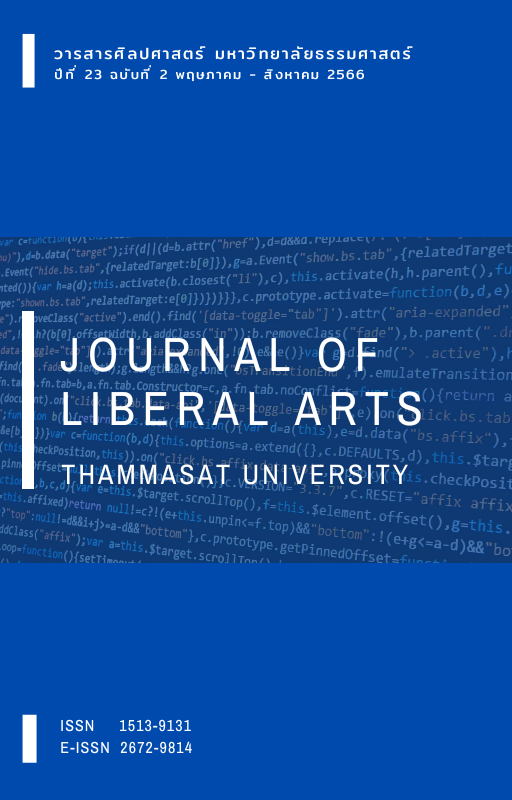Becoming Less Human: Margaret Atwood’s Climate Emergency and Posthuman Veganism in the MaddAddam Trilogy
Main Article Content
บทคัดย่อ
The anthropocene geological period is characterised by how humans have rapidly become the dominant force driving the entire planet to climate and environmental destruction. Humanity’s anthropocentrism values humans as the most important form of existence and all other nonhuman beings as commodities that exist for human ends. These situations of anthropocentrism and its catastrophe are exemplified in Margaret Atwood’s dystopian climate fiction MaddAddam (2013). The article examines how this last book of the trilogy redefines humanity’s place in the world among all nonhuman others by addressing veganism within posthumanist elements of MaddAddam — the hybridity of human and nonhuman animal characters: Crakers, Pigoons and Frankenbabies — as a way for Atwood to address humanity’s ethics of eating from a non-anthropocentric perspective and to offer a way to carefully interrogate humans’ ethics. All of the posthuman creatures’ food ethics are intertwined with environmental and moral issues. It is my argument that posthuman veganism in Atwood’s MaddAddam establishes how humanity must learn to respect other nonhuman beings to survive after the collapse of humanity’s corporate-centred world that eventually drives humans off the top of a hierarchy to the brink of extinction. The article focuses on how Atwood utilises speculative fiction and veganism to push the human-animal boundary through the process of humanising and animalising to rethink humans’ ethical condition, especially regarding eating, to terminate anthropocentrism in order to cohabit a multispecies world respectfully and so avoid the future of climate doom.
Downloads
Article Details

อนุญาตภายใต้เงื่อนไข Creative Commons Attribution-NonCommercial-NoDerivatives 4.0 International License.
เอกสารอ้างอิง
Adams, C. J. (2010). The sexual politics of meat: A feminist-vegetarian critical theory. Continuum.
Adams, C. J. (2018). Neither Man nor Beast : Feminism and the defense of animals. Bloomsbury Publishing.
Aksehir-Uygur, M. (2014). Utopia and dystopia intertwined: The problem of ecology in Margaret Atwood’s Oryx and Crake, the year of the flood and MaddAddam. The Journal of International Social Research, 7(31), 41-48.
Atwood, M. (2013a). Oryx and Crake. Virago Press.
Atwood, M., (2013b). The year of the flood. Virago Press.
Atwood, M. (2014). MaddAddam. Virago Press.
Atwood, M. (2015). It’s not climate change: It’s everything change. Medium. https://medium.com/matter/it-s-not-climate-change-it-s-everything-change-8fd9aa671804
Buell, L. (1995). The environmental imagination: Thoreau, nature writing, and the formation of American culture. Belknap Press of Harvard University Press.
Clarke, B., & Rossini, M. (Eds.). (2016). The Cambridge companion to literature and the posthuman. Cambridge University Press. https://doi.org/10.1017/9781316091227
Dutkiewicz, J., Taylor, A., & Vettese, T. (2020). The Covid-19 pandemic shows we must transform the global food system. https://www.theguardian.com/commentisfree/2020/apr/16/coronavirus-covid-19-pandemic-food-animals
Griffin, G. (Ed.). (2013). Research Methods for English Studies (2nd ed.). Edinburgh University Press.
Pinn, A. B. (2021). The Oxford handbook of humanism. Oxford University Press.
Harari, Y. N. (2015). Sapiens: A brief history of humankind. Vintage.
Haraway, D. (2008). When species meet. University of Minnesota Press.
Heise, U. (2020). The Planetary Futures of Eco-Apocalypse. In J. Hay (Ed.), Apocalypse in American literature and culture. Cambridge themes in American literature and culture (pp. 268-280). Cambridge University Press. https://doi.org/10.1017/9781108663557.021
Khandker, W. (2014). Philosophy, animality and the Life Sciences. Edinburgh University Press.
Klein, N. (2015). This changes everything. Penguin Books.
Micali, S. (2021). “What if they could speak?: Humanized animals in science fiction.” In A. Masschelein, F. Mussgnug, & J. Rushworth (Eds.), Mediating vulnerability: Comparative approaches and questions of genre (pp. 19-37). UCL Press. https://doi.org/10.2307/j.ctv1nnwhjt.5
Moore, B. (2017). Ecological literature and the critique of anthropocentrism. Palgrave Macmillan.
Ranisch, R., & Sorgner, S. L. (2014). Post-and transhumanism: An introduction. Peter Lang GmbH.
Shelley, M. (2010). Frankenstein. Collins Classics.
The Vegan Society. (n.d.). Definition of veganism. Retrieved December 7, 2022, from www.vegansociety.com/go-vegan/definition-veganism
Vint, S. (2007). Bodies of tomorrow: Technology, subjectivity, science fiction. University of Toronto Press.
Vint, S. (2010). Animal alterity: Science fiction and the question of the animal. Liverpool University Press.
Vint, S. (Ed.). (2020). After the human: Culture, theory and criticism in the 21st century (After Series). Cambridge University Press. https://doi.org/10.1017/9781108874427
Wright, L. (Ed.). (2021). The routledge handbook of vegan studies. Routledge.
Zeldin-O’Neill, S. (2019.) ‘It’s a crisis, not a change’: the six guardian language changes on climate matters. The Guardian. https://www.theguardian.com/environment/2019/oct/16/guardian-language-changes-climate-environment


